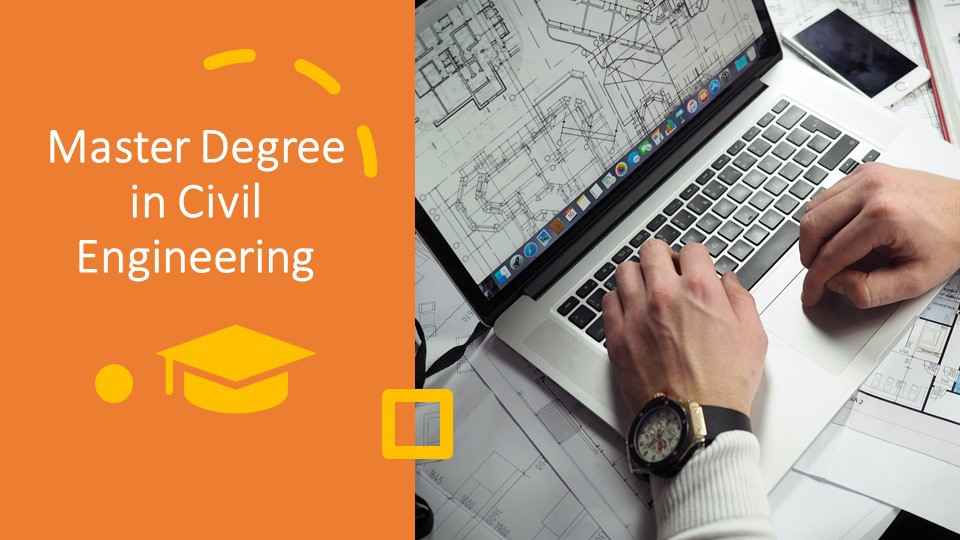Master's Degree with Different specialization in Civil Engineering
- By
- Pooja |
- March 14, 2022 |
- Civil Engineering,

Table of Contents
Why Master's Degree (M.Tech or M.S) is useful after Engineering Degree?
What are the career option after a Master's Degree (M.Tech or M.S)
Different courses for the Master's Degree Program
Master's Degree in Structure Engineering
Master's Degree in Transportation Engineering
Master's Degree in Water Resources Engineering
Master's Degree in Construction and Project Management
Master's Degree in Environment Engineering
Master's Degree in Geotechnical Engineering
Master's Degree in Earthquake Engineering
Why Master's Degree (M.Tech or M.S) is useful after Engineering Degree?
If you intend to focus on engineering as your primary passion, work in an engineering-related field and conduct research in engineering, then a master's degree (M.Tech or M.S) would be the ideal option for you. While master's degree (M.Tech or M.S) is a considerably more specialized curriculum than MBA. In a master's degree (M.Tech or M.S) you will be confined to one single sector within the engineering or science stream.
What are the career option after a Master's Degree (M.Tech or M.S)
Upon completion of a master's degree (M.Tech or M.S), a variety of job options are available to the students. Because of the high rate of growth in the country, as well as the demand for competent engineers, there are a variety of opportunities for master's degree (M.Tech or M.S) holders.
Following completion of a master's degree (M.Tech or M.S), a student can pursue a variety of employment paths, including the following:
Corporate Sector: If a person obtains his or her master's degree (M.Tech or M.S) from a reputable college, there are several prospects in the corporate sector to get a job.
Employment prospects after completing a master's degree (M.Tech or M.S) include positions with consulting firms (such as AECOM, JACOBS, WSP, Ramboll, etc. Core engineering firms (such as Punj Lloyd and L&T ECC).
Research & Development: In the field of research and development, Following completion of the master's degree (M.Tech or M.S), the possibility of super-specialization and additional study (for example, a PhD) is always available.
The teaching profession is yet another option open to those who have completed their master's degree (M.Tech or M.S). There are several teaching positions available in the country as a result of the creation of a number of new technical institutions.
Different courses for the Master's Degree Program
- Structure Engineering
- Transportation Engineering
- Water Resources Engineering
- Construction and Project Management
- Environment Engineering
- Geotechnical Engineering
- Earthquake Engineering
Master's Degree in Structure Engineering
Structural Engineering is a specialized field of Civil Engineering that specializes in building structures. Structural Engineers develop design models, drawings and specifications, make calculations, analyse the design work of team members or other engineers, prepare design reports and evaluations, and inspect project sites in their professional capacity.
Structural engineering is a form of civil engineering that deals with the effects of physical force on structural parts that are designed to withstand such forces. The structural engineering discipline is concerned with the assignment of numerical values to physical forces and the evaluation of how different structural parts will behave to these numerical values.
Read More:
Master's Degree in Transportation Engineering
Affectionately known as transportation engineering, it refers to the application of technical principles to the development of transportation facilities for the use of the various modes of transportation in order to ensure that people and goods are transported in a safe and efficient manner while also being comfortable, convenient and cost-effective while also being environmentally friendly.
The planning components of transportation engineering are related to features of urban planning and entail judgments about technological predictions as well as political considerations.
It is customary for technical forecasting of passenger travel to use an urban transportation planning model, which necessitates estimating the number of purposeful trips, trip distribution (where the travellers want to go), mode choice (which mode the traveller is using), and route assignment for each trip (the streets or routes that are being used).
Other components of traveller decisions that may be included in more complex forecasting include vehicle ownership, trip chaining (the option to link individual trips together in a tour), and the location of one's home or place of business (known as land use forecasting). It is the passenger journeys that are the focus of transportation engineering since they frequently represent the highest point of demand on any transportation system.
Read More:
- How to Become a Road Safety Auditor: 10 Important Points
-
How to become a successful Transportation Engineer - 8 Key Points
Master's Degree in Water Resources Engineering
In the broader field, water resource engineers advise on sustainable use of resources by conserving water, building dams and conveying water to users. Their planning ensures holistic, integrated management of water which balances the needs of nature with those of users.
Master's Degree in Construction and Project Management
Unlike construction managers (CM), who are responsible just for the building phase of a project, project managers (PM) are accountable for all elements of a project's management from its inception to conclusion. All subcontractors and other parties engaged with the construction project are under his supervision.”
Read More:
- Primavera P6 Tutorial Online Course- In 12 Superb Modules
-
Microsoft Project Tutorial Online Course- In 17 Perfect Modules
Master's Degree in Environment Engineering
It is the combination of sciences and engineering concepts to enhance the environment, provide safe water, air, and land for human habitation and other species, and to clean up contaminated locations. Engineers in this field are responsible for environmental pollution control and trash management.
Master's Degree in Geotechnical Engineering
It is the study of soil behaviour under the influence of loading forces as well as soil-water interactions that are referred to as geotechnical engineering. This information is put to use in the design of retaining walls, foundations, clay liners, earth dams, and geosynthetics for waste containment, among other projects.
By 2024, the job market for geotechnical engineers is predicted to expand by around 11%, ensuring that geotechnical engineering is a rewarding career path that will provide excellent possibilities for Civil Engineering graduates.
Master's Degree in Earthquake Engineering
Earthquake engineering is an interdisciplinary area of engineering that encompasses a variety of disciplines. It covers the design and analysis of structures such as buildings and bridges considering earthquakes parameters into design consideration.
Design, construct and maintain structures such that they operate according to expectations and are in line with building codes when subjected to seismic loads. Earthquake engineers research the causes of infrastructure and building failure during earthquakes and then apply their findings to the planning, design, construction, and management of earthquake-resistant structures and facilities. They are also known as earthquake engineers.
I hope the blog gives you a good understanding of the importance of a Master's Degree Course after a Civil Engineering Degree. Please feel free to like, share and comment.
Admin, gcelab.com Please see our Pillar Post to know why we founded gcelab.com.
Read More:
- What is the Function of Bridge Foundation or Pier and its Types? 5 Important Points
- 10 Latest Type of Bridges and its components

Pooja
Founder at gcelab.com, Pooja is an Entrepreneur unlocking human potential. Working in the Principles of Lean Start-up, Pooja believes in Transparency and User Happiness the most. Pooja’s background in teaching gives her a sophisticated grasp on even the most tedious aspect of course building. She is passionate about people who believe that good is not enough.
Previous Post

